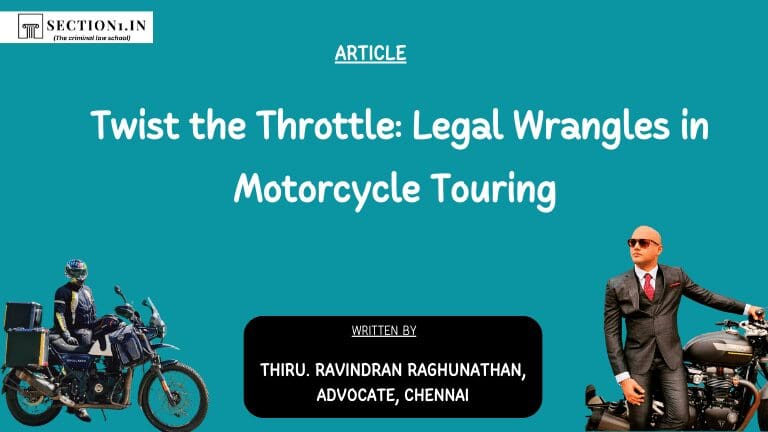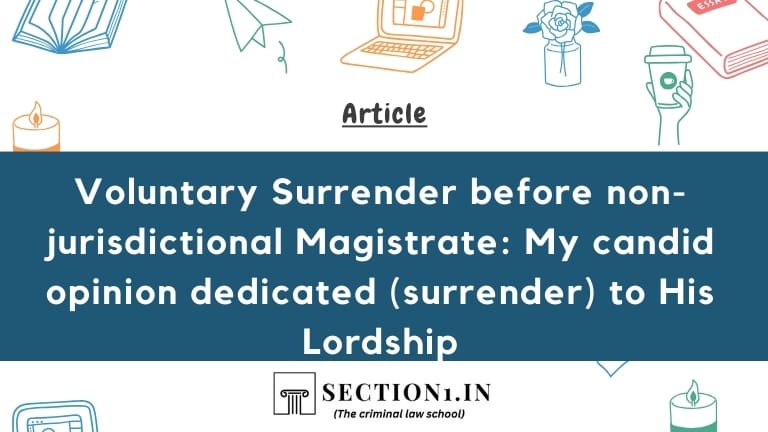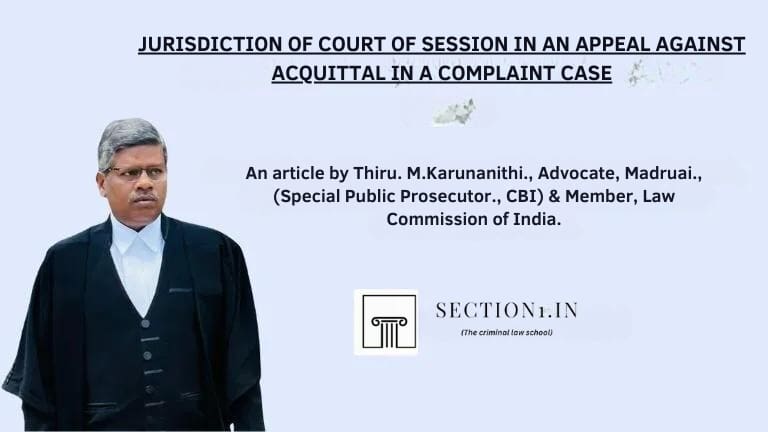My senior always says to me that “read the section as it is, understand as it is and express the section as it is”.
This article is an approach to the intention of the draftsmen behind the provisions of sections 301 and 302 of the Code and how they empowered the Magistrates and Courts by these sections. By approaching such, I’ve found out that the draftsmen have categorised CHAPTER XXIV for “GENERAL PROVISIONS AS TO INQUIRIES AND TRIALS” and listed the provisions inside this chapter by its stage in the criminal proceedings. For example, section 301 Cr.P.C is the provision for appearance by Public Prosecutor in criminal proceedings (first stage in criminal proceeding). Section 302(1) is for the person who can conduct the prosecution in police case and section 302(2) is for the person who can conduct prosecution in complaint case. This paragraph is for the total understanding of the subject matter of this entire article and the subsequent paragraphs are the rich explanations for that.
Now,
The words ‘any court’ present in section 301 Cr.P.C are absent in section 302 Cr.P.C and stipulates only Magistrate’s court. Hence, section 302 Cr.P.C specifically applies only to ‘Magistrate’ court. In addition to this, section 225 Cr.P.C bans the appearance of the private person through a private lawyer. Therefore, the private person who is the victim or de-facto complainant can Assist the court under section 302(2) Cr.P.C in all the Magistrate courts but not in Sessions court instead they can Assist the Prosecution as per section 301(2) Cr.P.C.
When writing the Code of Criminal Procedure, the draftsmen have considered the importance of private persons also to conduct the prosecution who has initiated the proceeding through a complaint (see: sections 2(d) r/w 190(1)(a) Cr.P.C). To identify the same, it is apparent that the draftsmen have inserted section 302(2) Cr.P.C which reads as follows:
“(2) Any person conducting the prosecution may do so personally or by a pleader”.
If we read the sequence of provisions listed under CHAPTER XXIV – GENERAL PROVISIONS AS TO INQUIRIES AND TRIALS, we can classify that section 301 Cr.P.C explains ‘only’ the appearance of the Public Prosecutor, Assistant Prosecutor or Assisting the prosecution who are in-charge of a case initiated under the police report before any court (which includes Sessions and High Court). This means, the draftsmen wanted the readers to understand that their intention was to draft about the police case first and by whom it shall be conducted and assisted.
If we envisage section 302(1) Cr.P.C, it obviously empowers the concerned Magistrate to grant permission to conduct the prosecution by ‘any person’. The term ‘any person’ here includes the police officer who is in the rank of Inspector and above. But, Advocate General, Government Advocate, Public Prosecutor, Assistant Public Prosecutor are not necessary to conduct the prosecution with such permission of the Magistrate. However, the proviso to section 302(1) Cr.P.C bars the Magistrate to grant permission to the Police Officer who has taken part in the investigation to conduct the prosecution by himself.
Next, Section 302 (2) Cr.P.C empowers the concerned Magistrate to grant permission to ‘any person’ who is conducting the prosecution may do so personally or by a pleader. Here, as per our understanding ‘any person’ does not include police officers? How contrary?
Explaining the contrary, ‘any person’ is the only term which connects sections 302 (1) and (2) Cr.P.C; and with regard to the term ‘any person’ under section 302(1) Cr.P.C, as we have already seen, the inspector who has taken part in the investigation even-though come within the purview of the term ‘any person’ the proviso to section 302(1) Cr.P.C bars him to conduct the prosecution and thus he has no other choice but to conduct the case only through P.P or A.P.P with the aid of sections 24 and 25 Cr.P.C.
Therefore in the light of the above sequence, section 302(2) Cr.P.C gives discretionary power to the Magistrate to grant permission to ‘any person’ to conduct either by himself or by a pleader. Besides section 302(1) Cr.P.C bars police officers investigated the case does not come within the meaning of ‘any person’, it goes without saying that section 302(2) Cr.P.C is not meant for police case but for ‘complaint case’.
Now, if section 302(1) Cr.P.C itself clarified who can conduct the prosecution in police case, then how come it is possible for a private person could conduct the case in the place of Public Prosecutor?
Right, if we read section 302 (2) Cr.P.C carefully, it is clear, that the draftsmen have inserted it ‘only’ to enable the concerned Magistrate to permit the prosecution to be conducted by the person who has filed the ‘complaint’ before him (though it does not say in open terms). Here in section 302(2) Cr.P.C the words ‘any person’ denotes either the complainant himself or a pleader appointed by him only, inasmuch as, the grant of permission for prosecution in police case is explained unequivocally in the foregoing section i.e., section 302(1) Cr.P.C.
In other words, the intention of the draftsmen is to empower the Magistrate to permit the prosecution (in police case) to be conducted by the police person who has filed final report as per section 302(1) Cr.P.C; but since the proviso to section 302(1) Cr.P.C bars the police officer to conduct the Prosecution by himself, he is engaging the P.P or A.P.P. Also, it is further intended by the draftsmen to empower the Magistrate to grant permission to conduct the prosecution by a private person under section 302 (2) Cr.P.C who has filed a complaint (only in complaint case) by himself or through a pleader inasmuch as here there is no bar.
In an another angle, by reading the sequence of sections 301 and 302 Cr.P.C we understand that it is not the intention of the draftsmen to grant permission to the private person to take over the prosecution initiated through the final report. It is the Hon’ble Supreme Court (through judgments (judge made law)) in addition to the above power has granted such a wide power to the concerned Magistrates to permit the ‘private person’ may also to conduct the police case instead of conducting by the Public Prosecutor (or by A.P.P), in turn, the private person (informant/de-facto complainant/victim) can conduct the prosecution through the private pleader.
Judgments relating to this article.
Concept of intervener in bail application: P.S. Saravanabhavanandam and Ors. vs S. Murugaiyyan and Ors – 1986-LW(Crl)165 – Cr. M.Ps. Nos. 9167 of 1985 and 16 of 1986 – 17.02.1986 – Mad – HC.
Concept of intervener in bail applications in special Acts: Sathyavani Ponrani vs. Samuel Raj & Another [M.M.Sundresh. J] – 2010(4) CTC 833.
Section 301 Cr.P.C – Elements: Varsha Garg vs. The State of Madhya Pradesh and Ors. (Criminal Appeal No. 1021 of 2022 – 08.08.2022 – SC – 2022/INSC/807.
Role of third party – Explained: S.Dharmar and others vs. State – 1986 MLJ (Cri) 79 (Vol-30)].
What is the role of the ‘Private person’ in Criminal trial? A junior to the senior: Shivkumar v. Hukum Chand – (1999)7 SCC 467=(1999) SCC (Cri) 1277.
In Sessions court: Shivkumar v. Hukum Chand – (1999)7 SCC 467=(1999) SCC (Cri) 1277.
Whether prosecutor’s permission is necessary to allow the petition? D.Durauraj vs. State of T.N – 2017 (3) MWN (Crl) 448 (Mad).
Victim’s counsel can bring the issues to the notice of the court Iif prosecution fails to do)? We agree with the observations made by the Tripura High Court in Smt. Uma Saha v. State of Tripura (supra) that the victim’s counsel has a limited right of assisting the prosecution, which may extend to suggesting questions to the Court or the prosecution, but not putting them by himself – Rekha Murarka vs. The State of West Bengal and Ors – Criminal Appeal No. 1727 of 2019 – 20.11.2019 – SC – AIR 2020 SC 100 – 2019/INSC/1269.
Section 301(2) Cr.P.C – Discharge – No assistance during discharge stage: H.Sathak Ahmed Shaw vs The Inspector of Police, J-9, Thuraipakkam Police Station, Kancheepuram District – Criminal Revision Case Nos. 684 and 922 of 2015 – 16-10-2015.
Section 302 Cr.P.C – Discharge Stage – Yes by on its own merits: Dhariwal Industries Ltd vs. Kishore Wadhwani and Ors – 2016(3) MWN (Cri) 161 (SC).
Section 301(2) Cr.P.C – During trial: Shakeel Ahmed vs. Union of India (UOI) and Ors – W. P. (Civ) No. 182 of 2001 – 04.11.2022 – SC= 2022/INSC/1162.
Section 301(2) Cr.P.C – Appeal – Only during the final argument: Srinath Prasad vs State – 2004 CriLJ 3635 (Mad)].
Section 301 Cr.P.C – Victim – Right to be heard: The victim/de-facto complainant has the right to participate in the criminal proceedings, which includes right to be impleaded, right to know, right to be heard and right to assist the court in pursuit of truth. This right has been recognized by both the above judgments passed by the Hon’ble Supreme court – Amir Hamza Shaikh & ors vs. State of Maharashtra & anr – Crl.Apl No: 1217 of 2019 – dt: 7.8.2019 – (2019)3 MLJ (crl) 579 following Sivasubramanian vs. The State of Tamil Nadu, rep. by its secretary to Government, Legal Department, Secretariat, Chennai – W.P (MD) NO. 21119 of 2019 – dt:01.10.2019.
Section 301 Cr.P.C – Victim Rights: State must provide advocate for the victim in state’s expense: Jagjeet Singh And Others vs. Ashish Mishra Alias Monu and Anr – (2022) 9 SCC 321 followed in X vs. The State of Maharashtra and Ors. Criminal Appeals No. 822-823 of 2023 – 17.03.2023 – SC – 2023/INSC/252.
Section 302 – Complaint about the prosecutor is must: Joseph Jayaseelan vs. The State and Ors – Crl. R.C. (MD) No. 443 of 2023 (02.06.2023 – MADHC).
Section 302 Cr.P.C – Continue prosecution by the heirs of the complainant: It was held and well settled by the Supreme Court – Rahida Kamaluddin Syed v. Shaikh Saheblal Mardan – 2007 AIR SCW 2258 following Jimmy Jahangir Madan vs. Bolly Cariyappa Hindley – 2004 AIR SCW 6248 and Ashmwin Nanubhai vyas vs. State of Maharashtra & another – (1967) 1 SCR 807=AIR 1967 SC 983 that a person other than a complainant could continue prosecution; CHAND DEVI DAGA vs. MANJU K. HUMATANI – Crl Apl No: 1860 of 2017 – 03-11-2017 – (2017) 13 Scale 239=(2018) 1 SCC 71=(2018) 1 SCC(Cri) 264.
Section 302 – Continue prosecution by the holders of the ‘Continue prosecution by the holders of the power of attorney’ Executed by the legal heirs of the complainant: AIR 2005 SC 48=2004 AIR SCW 6248 – Jimmy Jahamgir Madan vs. Bolly Cariyappa Hindley.
Continuation of prosecution cannot be done through a power of attorney if he is an accused: AIR 1999 SC 1385=1999 AIR SCW 1062 – T.C.Mathai vs. District and Sessions Judge, Thiruvananthapuram (But in no case can the appearance of the accused be made through a power of attorney holder).
Power of attorney: AIR 2005 SC 48=2004 AIR SCW 6248 – Himmy Jahangir Madan vs. Bolly Cariyappa Hindley.
Section 302 Cr.P.C – Power of attorney to appear in a case: Goa Antibiotics & Pharmaceuticals Ltd vs. R.K. Chawla & others – 2011 (3) MWN (Cri) 290 (SC).
Section 302 Cr.P.C – Adducing evidence: Kadiresan vs. Kasim and Ors – 1987 Cr.L.J 1225 (Mad).
Sections 301 & 302 Cr.P.C – Distinction: Dhariwal Industries Ltd vs. Kishore Wadhwani and Ors – 2016(3) MWN (Cri) 161 (SC); Sister Mina Lalita Baruwa Versus State of Orissa & Others – 2013 (16) SCC 173= 2014 CrLJ 671.
Section 302 Cr.P.C – Witness – Advocate engagement: Supreme Court in the case of Banti @ Guddu v. State of Madhya Pradesh, reported in 2003 (7) Supreme Today 691 followed in R.Solairaj vs. The S.P – 2017(2) TNLR 806 (Mad).
Section 302 Cr.P.C – Victim – Mere asking not enough: Amir Hamza Shaikh & ors vs. State of Maharashtra & anr – Crl.Apl No: 1217 of 2019 – dt: 7.8.2019 – (2019)3 MLJ (crl) 579].
by: RAMPRAKASH RAJAOGPAL
ADVOCATE, CHENNAI
Further study
- Further Investigation: Magistrate can direct further investigation under section156(3) Cr.P.C till framing of charges
- WHETHER MAGISTRATE CAN TAKE COGNIZANCE ON PRIVATE COMPLAINT EVEN AFTER ACCEPTING THE NEGATIVE REPORT FILED BY THE POLICE? (and) HOW TO WRITE PROTEST PETITION AND ITS APPRECIATION?
- NO PRIVATE FUNDING IN POLICE INVESTIGATION
- WHETHER PROTEST PETITION IS “COMPLAINT”?
- During a criminal trial, the counsel appointed by the victim takes over the prosecution from the state prosecution examine the same in the light of the legal provisions






